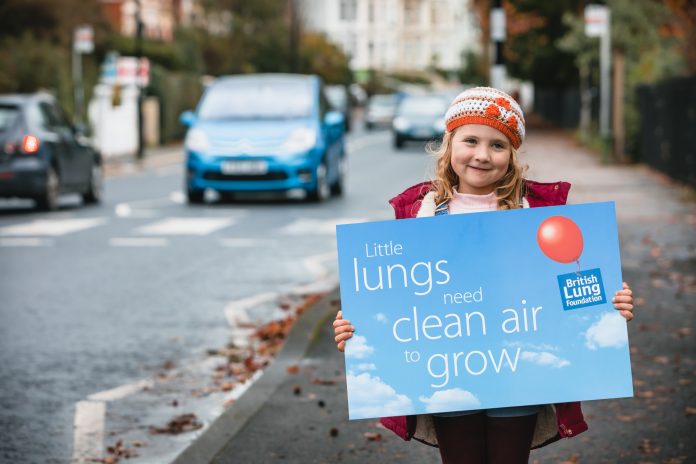Zak Bond, Policy Officer at the British Lung Foundation, explores why the government must commit to stronger air pollution targets to protect our lungs as we recover from COVID-19
Fine particulate matter (known as PM2.5) is the most dangerous type of air pollution for human health. It is made up of small particles and, because of its size, these particles can burrow deep into your lungs and around your body. In fact, scientific research shows that these particles can affect almost every organ of the body. Along with the gas NO2, PM2.5 is the main air pollution problem we face in the UK.
This pollution has a major impact on the quality of life for people with a lung condition such as asthma or COPD. A spike in air pollution levels can lead to symptoms getting worse, flare-ups and even the risk of hospitalisation. Yet the legal limits for PM2.5 currently set out in the UK are twice as high those recommended by the international experts at the World Health Organization (WHO).
In a recent interview, Dr Maria Neria, Director in Public Health and the Environment at the WHO, said these recommended limits should be considered a baseline for “leaders who want to get serious about air pollution.” It is clear that the government should take heed of this statement from the WHO and commit in legislation to meeting at least WHO guideline levels for PM2.5 by 2030 at the latest.
The Environment Bill is the key opportunity for them to make this commitment, yet progress towards meeting these guidelines has been slow so far. The government have said that they will use the Bill to set a new target for PM2.5. However, as drafted the Bill allows them to wait until 2022 to do this and doesn’t say what level the target should be set at This isn’t good enough. The people who are living a poorer quality of life because of the pollution in our villages, towns and cities cannot afford to wait until 2022 to see actionable change from our government.
The Environment Bill allows the government to legislate for WHO standards now and commit to achieving these by 2030, at the latest. Yet instead of taking this opportunity, it looks like the Government won’t return the Bill to parliamentary scrutiny until September. With sections of the Bill needing to be enacted by the end of the year, it is alarming that the government might try to rush the legislation through in autumn, without taking the time to implement the necessary changes we need to see to tackle air pollution now.
People recovering from COVID-19 need this commitment from government
There has never been a more crucial time to tackle air pollution in the UK. As the government continues to tackle the COVID-19 pandemic, it is important to note that an emerging body of research from academics across the world has shown a possible relationship between higher levels of air pollution and increased risk of dying from COVID- 19. Some of this research even suggests that coronavirus may be able to piggyback on the particulate matter as a route into the lungs. However, it must be said this is a very early-stage research and much of it has not yet been subject to rigorous peer review.
But while we may not yet know the extent of the links between COVID-19 and air pollution, the link between air pollution and lung health is well established and poses a public health crisis we simply cannot continue to ignore. From increased risk of an asthma attack to reduced lung function in children, it is clear our current levels of air pollution are unsustainable.
Many people whose lives are worst affected by air pollution – including some of those with COPD and asthma – are those who are also most at risk from COVID-19. We also have developing evidence from Asthma UK and British Lung Foundation surveys of people recovering from COVID-19 which show that, of people who told us they were experiencing problems linked to coronavirus weeks after their recovery, 90% were still having difficulty breathing.
We must make sure that the people recovering from COVID-19 and managing other respiratory illnesses have clean air to breathe, both during and after the pandemic. As there is now emerging evidence which suggests that COVID-19 may leave some patients with long-lasting lung conditions, it is crucial that we see legislation now which will help pave the way for cleaner air in the UK. A PM2.5 target which is at least in line with the WHO guidelines would help embed action at national and local levels, and ensure that all parts of government are working towards tackling the problem of air pollution. We must then push these levels even lower – there is no safe level of PM2.5 exposure.
The Environment Bill is an opportunity to prioritise lung health
The pandemic has brought thoughts about lung health to the fore and we are all now acutely aware that we need to prioritise the health of our lungs. We cannot now continue to live with the current levels of air pollution, which affect the lung health of everyone living in the UK. It is high time that we saw WHO limits met in every part of the UK. We have seen glimpses of what clean air could feel like as a result of lockdown – it is time this became normality.
Find out more about the BLF’s campaign for stronger clean air laws at https://www.blf.org.uk/take-action/campaign/clean-air/environment-bill











